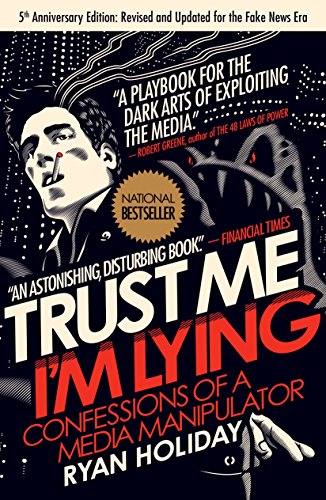Trust Me, I’m Lying: Confessions of a Media Manipulator by Ryan Holiday Link to heading
Summary Link to heading
“Trust Me, I’m Lying: Confessions of a Media Manipulator” by Ryan Holiday is an exposé of the manipulative practices within the modern media landscape. Holiday, having worked as a media strategist, reveals the tricks and techniques employed to shape public narratives, influence news cycles, and exploit the weaknesses of online journalism. The book delves into the symbiotic relationship between bloggers, advertisers, and media outlets, emphasizing the role of sensationalism, misinformation, and the constant demands of the 24/7 news cycle. Holiday offers a firsthand account of how media manipulation not only influences public perception but can also have real-world consequences.
Review Link to heading
Ryan Holiday’s book provides a thought-provoking critique of contemporary media practices, offering an insider’s perspective on how easily media narratives can be manipulated for various agendas. The book’s strength lies in its candidness, shedding light on the often opaque operations behind news production. Some critiques of the book suggest it may lean heavily on anecdotal evidence and might overgeneralize certain aspects of media manipulation. Despite this, Holiday’s insights have spurred important discussions about ethics, accountability, and transparency in journalism and digital media.
Key Takeaways Link to heading
- Media Fragility: The book demonstrates how the media’s reliance on traffic and sensationalism often leads to distorted reporting.
- Manipulation Techniques: Holiday outlines specific tactics used to manipulate the media, such as creating fake personas, exploiting sensational stories, and leveraging controversy.
- The Power of Misinformation: It highlights how misinformation can spread rapidly and become accepted truth within the media cycle.
- Cyclic Nature of News: Emphasizes the repetitive cycle of generating and feeding back into stories for sustained media traction.
- Critical Consumption: Encourages readers to critically assess the news and be skeptical of the sources of their information.
Recommendation Link to heading
“Trust Me, I’m Lying” is particularly beneficial for readers interested in media studies, journalism, marketing, or public relations. It serves as an eye-opening read for anyone seeking to understand the dynamics of online media and the ethical implications of news reporting. Media professionals, students, and those with a curiosity about the inner workings of the press will find Holiday’s insights both useful and cautionary.
